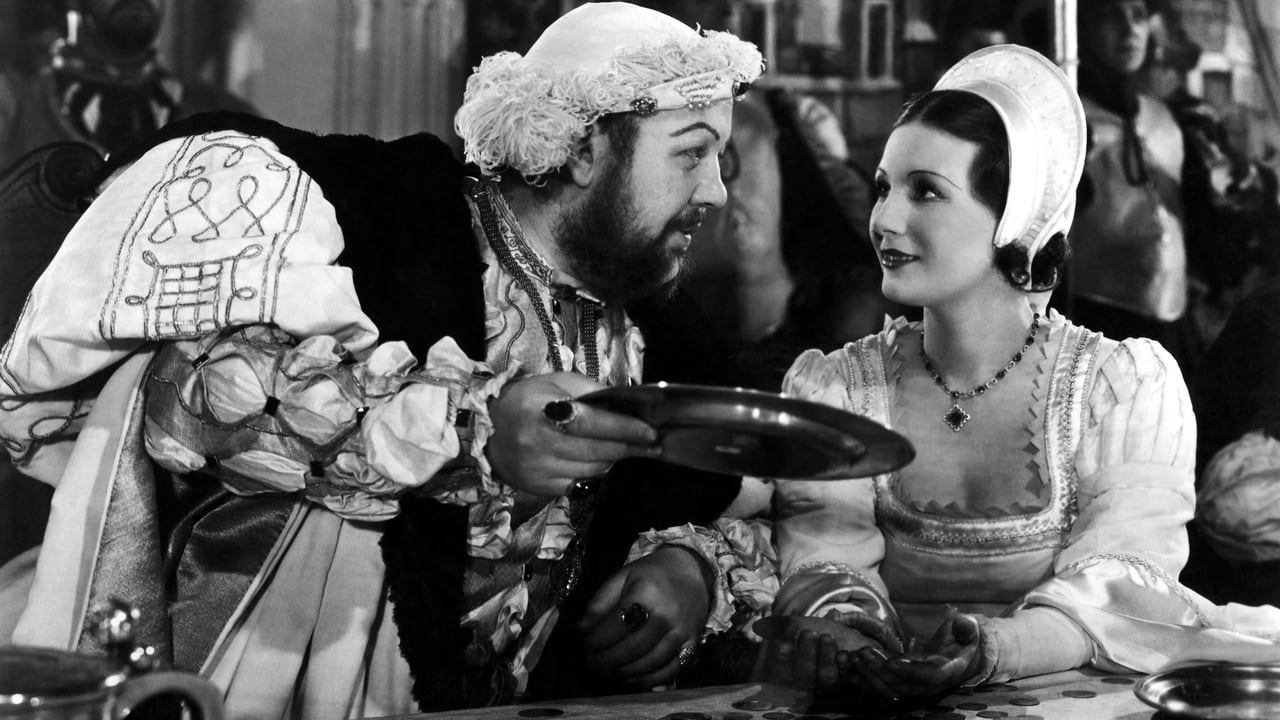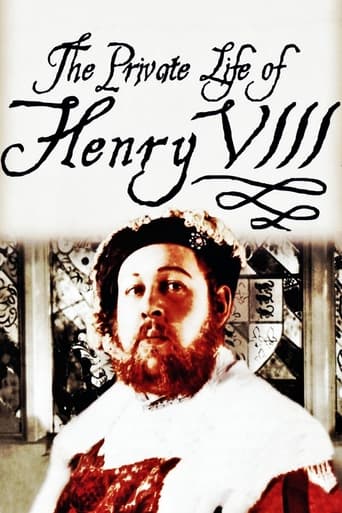AboveDeepBuggy
Some things I liked some I did not.
WasAnnon
Slow pace in the most part of the movie.
Delight
Yes, absolutely, there is fun to be had, as well as many, many things to go boom, all amid an atmospheric urban jungle.
JohnHowardReid
Copyright 3 November 1933 by United Artists Corp. Made by London Film Productions, England. New York opening at the Radio City Music Hall, 12 October 1933 (ran one week). London opening: 17 August 1933. U.K. release: 24 October 1933. 96 minutes.SYNOPSIS: King Henry VIII and five of his six wives.NOTES: Academy Award, Best Actor, Charles Laughton (defeating Leslie Howard in Berkeley Square and Paul Muni in I Am A Fugitive from a Chain Gang). Also nominated for Best Picture (Cavalcade). Number 3 on The Film Daily's annual poll of U.S. film critics (Cavalcade was first, 42nd Street second).Photographed at British and Dominion Studios. Shooting commenced late Spring 1933 and was completed in five weeks for a negative cost of Sixty Thousand Pounds. The film was a huge success world-wide, earning gross rentals in excess of Five Hundred Thousand Pounds on its first release. It was never withdrawn from circulation until the advent of television.COMMENT: Considering the enormous — indeed the super-star — popularity of Charles Laughton, it's peculiar that so few of his movies are aired on TV. Most viewers have seen The Sign of the Cross (1932), Jamaica Inn (1939), The Tuttles of Tahiti (1942), The Paradine Case (1948), The Big Clock (1948), Hobson's Choice (1954) and Witness for the Prosecution (1957) — seven pictures from a total of fifty-two. Many of Laughton's most famous movies have never been broadcast at all (Payment Deferred, Island of Lost Souls, White Woman, The Man on the Eiffel Tower) and even Henry VIII has not been seen for many years. This neglect by TV programmers is the more astonishing in view of a survey conducted a few years ago in which readers of a weekly magazine were asked to nominate which movie performance of the past they regarded as unforgettable. Vivien Leigh in GWTW topped the list, followed by Garbo's Camille, Donat's Mr. Chips, Laughton's Henry VIII, Laughton's Captain Bligh in Mutiny on the Bounty, Cagney in Yankee Doodle Dandy, Bogart in Casablanca, Gary Cooper in High Noon, Bergman in Casablanca, Rathbone as Sherlock Holmes. Only Laughton figured on the list twice. In fact, the judge commented that if the performances had been tabulated simply by players and not by films, Laughton was the over-all favorite by a wide margin. His other roles frequently mentioned were in If I Had a Million, The Barretts of Wimpole Street, Ruggles of Red Gap, Les Miserables, Rembrandt and The Hunchback of Notre Dame.Of all these brilliant portrayals, there is no doubt that Henry VIII was the greatest achievement of Laughton's career. He literally sweeps the rest of the characters right off the screen. Only his real-life wife, Elsa Lanchester, can hold up against him. Even Donat (who was later to make such an impression in The Citadel and Goodbye Mr Chips) and Merle Oberon seem pallid and colorless alongside him. True, he is marvelously costumed and made up and better served by the witty script. The director deliberately throws all the attention his way, virtually forcing him to carry the whole film — which he does magnificently. It's an acting tour de force — one of the most memorable impersonations in the entire history of the cinema.
MartinHafer
You should probably know that I was a world history teacher, so I tend to look at historical films differently from the average person. I love a good historical film but I am also very unforgiving of a sloppy film or one that gets its facts wrong. Keep this in mind when you read this review.Compared to the average 1930s historical film, this one is pretty good and pretty accurate. Aside from a few mistakes here and there (such as showing Anne Boleyn being publicly executed), the spirit of the film is pretty accurate to Henry in his later years. However, it shows an odd view of his life--completely bypassing his marriage to Catherine of Aragon (it said she was a good woman so her life was omitted--but she also was married to Henry the longest--and this would take up at least two movies to discuss well) as well as only giving the briefest glimpse of Boleyn just as she was being executed--but nothing more. So it skips a lot--and only shows a small glimpse of Henry's life (about a six year period). BUT, and this is important, there is STILL way too much material for this film. You see, during this time, Henry had five different marriages--and each is treated almost like a Cliff Notes version of the marriage.So, despite its limitations, is it entertaining? Well, perhaps. If you like historical period pieces and don't mind the sketchy nature of the film, it's fine viewing. The acting is very good--and Charles Laughton was in fine form. And the film looks beautiful. As for the script, it's pretty good--with some nice sparkling dialog.
Hitchcoc
This is an actors film. Charles Laughton takes Henry through different periods in his life. We are kept at arm's length when it comes to the realities of the political climate he faced and his obsessions. We are to accept him as a fat lovable, impulsive man who is able to simply command an execution without batting an eye. The wives are each interesting. We barely see Anne Boleyn (Merle Oberon) but then are given a series of quite interesting, though somewhat underdeveloped personages. Elsa Lanchester as Anne of Cleves comes across as a vacuous Lucille Ball type who plays cards rather than consummating the marriage. The movie really has no suspense. Henry is a bully, and he gets what he wants. His heartbreak is hard to sympathize with when we consider what he has been given by his lineage. Laughton's acting excellent, but we don't really get much of the real sense of the true figure. I guess that is left to other films and other directors.
Cyke
087: The Private Life of Henry VIII. (1933) - released 8/17/1933; viewed 3/12/07.Gandhi is sentenced to prison. Wiley Post flies solo around the world in his Lockheed Vega.BIRTHS: Marty Feldman, Dom Deluise, Jerry Fallwell, Julie Newmar. DOUG: Following his first foray into Hollywood with 'Island of Lost Souls,' Charles Laughton heads back to his native soil to play one of England's most famous historical figures, Henry VIII, the man who ruled all of Britain for 37 years and, according to this film, would have traded it all for one good wife. This film is a documentary compared to the last historical epic we saw Laughton in ('Sign of the Cross'). Laughton IS Henry VIII. He absolutely vanishes into the character, and helps the film rise above being rather dated and historically inaccurate. Impressive work for the make-up department on making Henry age. The whole film is basically about Henry's search for the perfect wife; it starts with the eve of the execution of Anne Boleyn (Merle Oberon) followed quickly by Henry's marriage to Jane Seymour (Wendy Barrie). Once she dies giving birth to Edward (Henry's only surviving son), Henry soon moves on to the delightfully odd German princess Anne of Cleves (Laughton's real-life wife Elsa Lanchester). There is a wonderful scene where Henry, deciding that this whole marriage isn't going to work, asks Anne for a divorce, which she happily accepts with a long list of demands. When he meets Catherine Howard (Binnie Barnes), it appears as if Henry has found his match, but it all falls apart after an adulterous affair. The movie finishes with Henry a withering old man, married to the stern Catherine Parr (Evelyn Gregg), and munching on quail behind her back. The restoration on the DVD is horrific. Much of the footage looks fuzzy, and there's a faint buzz on the audio throughout. It was hard to understand everyone's accents sometimes, and there's no closed captioning at all, so it was sometimes hard to follow what's going on. According to what I've read, Henry was historically far more of a brutal ruler than a jovial womanizer. Still, it's well-made and well-acted, the costumes look great, and Laughton's performance really makes it all work.KEVIN: 'The Private Life of Henry VIII' is a meandering, semi-enjoyable historical drama carried entirely on the back of the performance of its Oscar-winning star. Charles Laughton is absolutely pitch-perfect. Every minute he was on screen, I felt I was watching the real Henry VIII. There's a memorably chilling moment when Henry learns that Jane Seymour has perished in childbirth. Henry pauses, "Poor, poor Jane." He is genuinely emotional for a few heartfelt moments, until he snaps back up and asks about his newborn son, like nothing is wrong. Laughton's old-age make-up is most impressive. It took me more that half the film to realize he was aging before my eyes. Other than that, there's not much else to write home about. Numerous scenes run way too long while other dramatic story points are cut short (like the executions of Anne Boleyn and Katherine Howard, which take place off-screen.) None of the supporting players are able to keep things going when Laughton is absent, though some of them give an admirable effort. I liked how the Anne of Cleaves storyline was handled. When I hear about it in History class, how Henry liked the painting of Anne but changed his mind when he met her, he just sounded picky. But in the film, Elsa Lanchester's Anne is likable but far from marriage material. The scene where Henry asks for a divorce is highbrow hilarity. As far as storytelling, it's crazy difficult to squeeze Henry's marital tribulations into 97 minutes of film. I also wonder if there aren't other topics that could be covered which fall under the banner of Henry's private life.Last film: Baby Face (1933). Next film: Dinner At Eight (1933).

